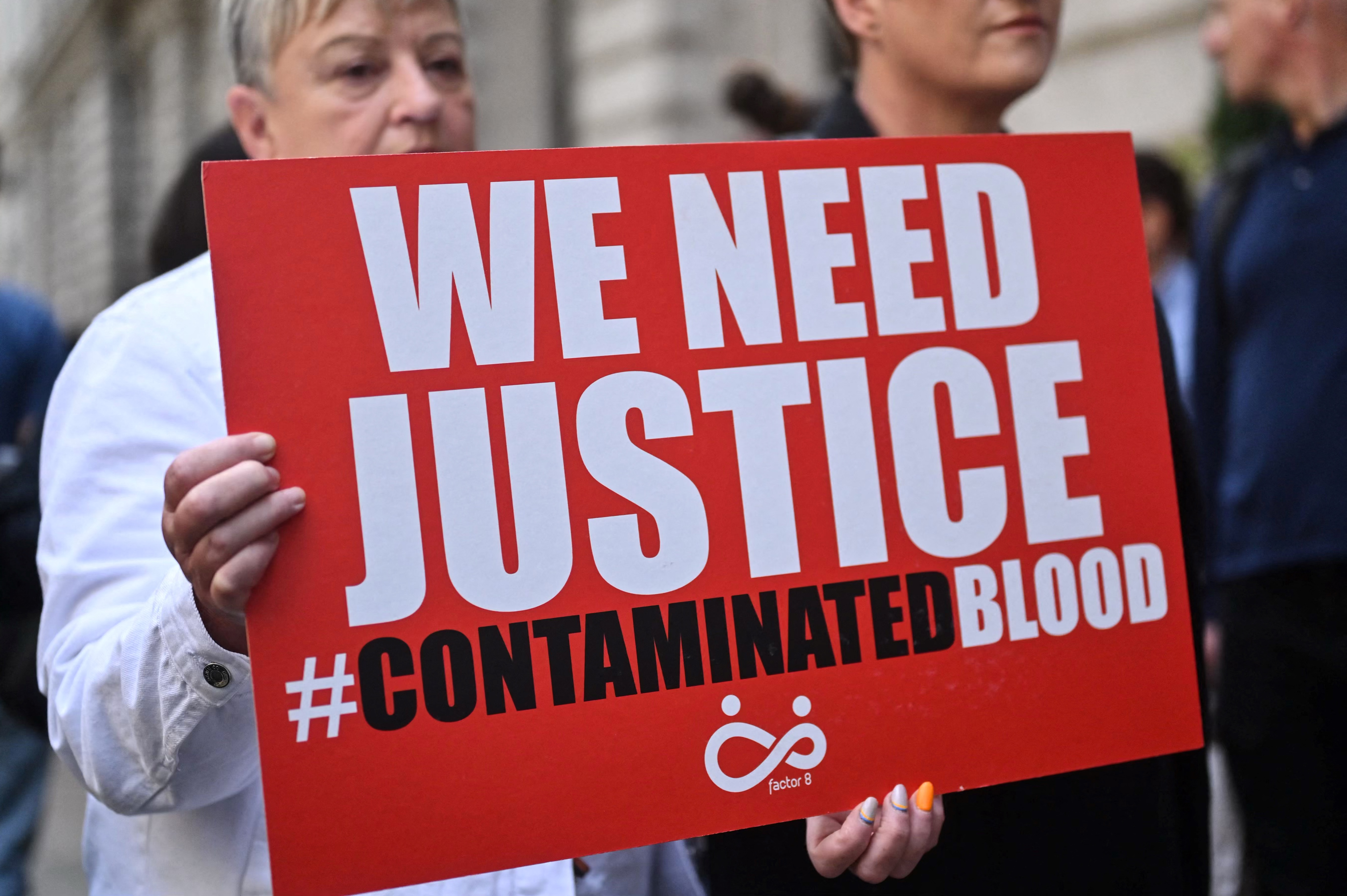The contaminated blood scandal
Widely regarded as the worst treatment disaster in the history of the NHS, the public inquiry is due to publish its report in May

A free daily email with the biggest news stories of the day – and the best features from TheWeek.com
You are now subscribed
Your newsletter sign-up was successful
The contaminated blood scandal is widely regarded as the worst treatment disaster in the history of the NHS. From the 1970s until 1991, up to 30,000 people in the UK were given blood infected with HIV and hepatitis.
At least 4,689 of those affected suffered from haemophilia, a rare genetic disorder in which the blood fails to clot, meaning that small injuries can result in dangerous blood loss. These patients were given contaminated blood-clotting agents. More than 3,000 people have died as a result, and thousands are still living with potentially lethal diseases.
In terms of human life, it was a disaster much more costly than Grenfell or Hillsborough. Furthermore, the victims of this appalling scandal, and their relatives, have had to wait decades for justice. In 2018, a full public inquiry was launched. After many delays, its report is finally due to be published on 20 May.
The Week
Escape your echo chamber. Get the facts behind the news, plus analysis from multiple perspectives.

Sign up for The Week's Free Newsletters
From our morning news briefing to a weekly Good News Newsletter, get the best of The Week delivered directly to your inbox.
From our morning news briefing to a weekly Good News Newsletter, get the best of The Week delivered directly to your inbox.
How did the scandal come about?
Most people who suffer from haemophilia lack a protein, factor VIII, that enables their blood to clot. Until the 1940s, when transfusions of blood plasma were first administered, there were no effective treatments. But in the 1960s, Dr Judith Graham Pool, a US scientist, made an important discovery: plasma could be broken down to produce a concentrate of clotting factors. In time, factor VIII concentrate could be administered at home, by injection, to haemophiliacs. This changed their lives and was soon in high demand: by 1973, doctors were warning that the UK wasn't producing enough of it to meet patients' needs. That same year, Britain started importing factor VIII from the US – a step that was fraught with risk, and had terrible consequences.
Why was it risky?
Unlike in Britain, where blood was donated voluntarily, donors in the US were paid. Pool had warned as early as 1974 that this was a "dangerous" and "unethical" practice: prisoners, sex workers, drug addicts and alcoholics did it to make easy money, despite their high risk of carrying blood-borne diseases. Batches of blood were mixed; one could include blood from up to 40,000 donors; one disease-bearing donor could infect the whole batch.
In one Louisiana prison, the journalist Cara McGoogan was told, "people who had turned yellow" from hepatitis carried on donating, bribing the inmates who worked in the plasma centre with cigarettes. In 1975, a World in Action documentary revealed that the NHS was buying blood harvested from drug users and "vagabonds" causing a surge in hepatitis cases among haemophiliacs.
When were the first infections?
There was an outbreak of hepatitis B in British haemophiliacs in the 1970s, soon after US blood products were first used. In December 1983, a British haemophiliac tested positive for HIV as a result of blood products, dying 18 months later of Aids-related illnesses. By April 1984, a memo showed that the Department of Health "conclusively" knew that HIV was in blood products. The WHO and The Lancet had already sounded warnings to the same effect.
A free daily email with the biggest news stories of the day – and the best features from TheWeek.com
The true scale of the UK disaster, however, only became clear in 1985, when Dr Peter Jones, director of the Newcastle Haemophilia Reference Centre, tested 99 of his patients. All but one had received commercial factor VIII; 76 tested positive for HIV. By 1986, UK patients were receiving much safer treatment: donors were vetted, and blood products were heat-treated. (Today, synthetic clotting factors are available.)
Why did it take so long to act?
This is what the inquiry was set up to analyse. There were some legitimate reasons for the failures. Many doctors were aware of the risk of infections, but felt that the great benefits of factor VIII outweighed them. And it was not established that HIV was blood-borne until the first deaths of haemophiliacs in 1982. Nevertheless, a long series of warnings was ignored.
In 1975, the then Labour health minister, David Owen, promised Britain would become self-sufficient in blood products to reduce infections. It never happened. It seems that a combination of governmental indifference, professional malpractice and commercial greed was responsible: factor VIII was very profitable for companies such Baxter International and Bayer. Many doctors did not inform their patients of the risks.
How did the inquiry come about?
Victims and their families have campaigned tirelessly for justice over a 40-year period, but with limited success: some have received annual support payments, but no organisation or individual in Britain (unlike in other affected countries) has been held to account, and, until recently, no substantial formal compensation had been agreed. In Scotland, the Penrose Inquiry, which reported in 2015, made only one recommendation after seven years of work, and was widely dismissed as a "whitewash". In 2017, Theresa May finally bowed to intense pressure from campaigners to announce a full inquiry into the scandal.
What will it achieve?
It has already laid bare the scale of the scandal. At least 1,250 people in the UK contracted HIV from contaminated blood; about half of them died from Aids-related illnesses. About 30,000 more contracted hepatitis C; 2,050 of these died of liver failure or cancer. Perhaps most significantly, the inquiry has heard testimony from the victims and their relatives. Colin and Janet Smith told how they lost their son, Colin, at the age of seven in 1990, after he was treated with HIV-infected blood; the words "Aids-dead" were painted on their home.
They believe their son was knowingly used as a guinea pig by the haematologist Professor Arthur Bloom. In 2022, the inquiry's chair, Brian Langstaff, also took the unusual step of calling for interim compensation of £100,000. The total compensation bill is expected to exceed £20bn.
-
 How the FCC’s ‘equal time’ rule works
How the FCC’s ‘equal time’ rule worksIn the Spotlight The law is at the heart of the Colbert-CBS conflict
-
 What is the endgame in the DHS shutdown?
What is the endgame in the DHS shutdown?Today’s Big Question Democrats want to rein in ICE’s immigration crackdown
-
 ‘Poor time management isn’t just an inconvenience’
‘Poor time management isn’t just an inconvenience’Instant Opinion Opinion, comment and editorials of the day
-
 Growing a brain in the lab
Growing a brain in the labFeature It's a tiny version of a developing human cerebral cortex
-
 A real head scratcher: how scabies returned to the UK
A real head scratcher: how scabies returned to the UKThe Explainer The ‘Victorian-era’ condition is on the rise in the UK, and experts aren’t sure why
-
 Health: Will Kennedy dismantle U.S. immunization policy?
Health: Will Kennedy dismantle U.S. immunization policy?Feature ‘America’s vaccine playbook is being rewritten by people who don’t believe in them’
-
 How dangerous is the ‘K’ strain super-flu?
How dangerous is the ‘K’ strain super-flu?The Explainer Surge in cases of new variant H3N2 flu in UK and around the world
-
 The stalled fight against HIV
The stalled fight against HIVThe Explainer Scientific advances offer hopes of a cure but ‘devastating’ foreign aid cuts leave countries battling Aids without funds
-
 Obesity drugs: Will Trump’s plan lower costs?
Obesity drugs: Will Trump’s plan lower costs?Feature Even $149 a month, the advertised price for a starting dose of a still-in-development GLP-1 pill on TrumpRx, will be too big a burden for the many Americans ‘struggling to afford groceries’
-
 Ultra-processed America
Ultra-processed AmericaFeature Highly processed foods make up most of our diet. Is that so bad?
-
 The ‘menopause gold rush’
The ‘menopause gold rush’Under the Radar Women vulnerable to misinformation and marketing of ‘unregulated’ products